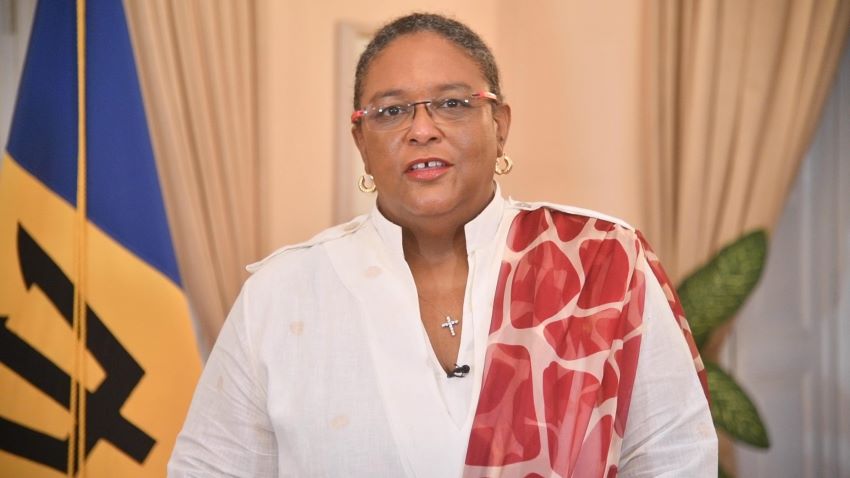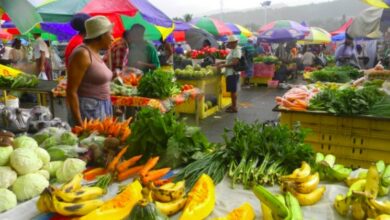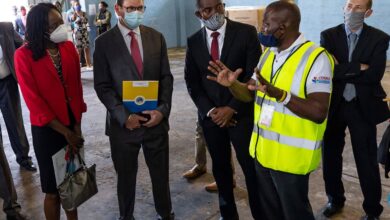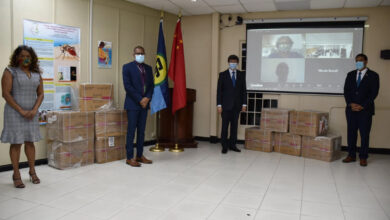Text of Address by Chair of the Caribbean Community (CARICOM), Prime Minister Mia Mottley of Barbados at the first-ever Inter-Sessional Summit of the Organisation of African, Caribbean and Pacific States (OACPS) on transcending the coronavirus (COVID-19) pandemic, Wednesday 3 June 2020.
I want to thank you and also to thank the Secretary General Chikoti too, for this his first summit of Heads and of course our brother, Dr. Tedros who has been carrying the battle for all of us across the world by ensuring that the WHO is that entity along with PAHO and CARPHA to right-size, literally, our access as small states in this world.
My brother almost six months ago when we met in your beautiful city in Nairobi, I posed the question does the ACP at this point of our destiny stand as a fast track to the future or is it a relic of the past. My conclusion then was that the ACP had to be a main platform for our economic growth and development; that we had to coalesce our efforts and strengthen our Partnerships, so as to ensure a future; that we had to recognize that we are always stronger together, and further, that we have an obligation which still remains outstanding to settle a new and humane framework for dealing with migrants particularly given the ever increasing problem of the numbers of persons being displaced as a result of the climate crisis, and I suspect as we go forward as a result of this pandemic.
Little did we know, in December last year, the extent to which this world would have changed in just a few months. The challenges which now confront our membership due to this pandemic, are a true test of the spirit and the letter of this revised Georgetown Agreement, and the Guiding Tenets of our Organization of African, Caribbean and Pacific States. Tenants, which are based fundamentally, on the principles that we have heard so much about and will continue to hear about; solidarity unity and partnership.
(Follow audio of address:)
We once thought that advancing our global engagement as an international organization would represent a platform of the acceleration of our integration into the world economy. We now know that our organization, as we said in December, must be a central platform for our joint action to ensure our very survival and that of our people
The revised Georgetown Agreement therefore requires of us to advocate for a multilateral system which contributes to our economic growth and our sustainable development, and to strengthen our political identity as a coherent force in the international arena in order to advance the interests of our membership. In our declaration, which we declared the Nairobi and Europe Hajoma Declaration, we committed to focus on multilateralism, sustainable development and growth.
The covid-19 crisis has shown as you have said my brother, undoubtedly that we cannot afford to allow multilateralism to die. The global threats, the global disease, the global crises, all require multilateral collaboration, commitment and responses. Our organization – 79 states – that is more than a third of the world’s states. And we meet today to demonstrate our willingness and our readiness to offer solutions and to call for global solidarity in combating this pandemic and indeed in combating any future global challenges through better preparedness prevention and response.
Today’s virtual Summit is an important extension of the work that we started in Nairobi in December and I commend you again my brother for your foresight and initiative in convening this meeting which will be remembered I guarantee for being an impetus for a truly global solution to the biggest crisis of our time.
This is the leadership that the world has been asking for and needs right now. And as a largest block of developing states spanning three regions – and we all have reflected on the time zones – our organization has the authority and the credibility to champion the call for global solidarity for action.
Indeed when we spoke in December, we reflected that our organization cannot be limited now by trade arrangements with former colonial powers. Now is the moment for coordinated global leadership and I have called for a Global Leadership initiative that brings together not just governments, but other people of influence because it is the behavior of individuals that has to change and hence it is not only the voice of governments that we need at this point in time.
Indeed we have recognised that that Global Leadership initiative, particularly in this 75th year after the United Nations was formed, is critical, since the United Nations and the Bretton Woods institutions reflected a world that is far different today from what existed at the time when those arrangements were settled. Most of our countries were not even independent at that point in time.
The interdependence therefore of the world since then has been magnified even more by this covid-19 pandemic that has spread with rapidity throughout our world simply because of the global interconnectedness of our countries and our people. At its Inception, the ACP group was primarily focused as I said on trade, so when we move now to a situation where we can have global comprehensive and inclusive activities and the extent to which the recovery of one country is linked to the recovery of others today we know that our organization must play a wider role. And we know it because 54 percent of the world’s GDP comes from trade among countries. Therefore the well-being of our individuals and oou citizens across our country’s depends on the strength and continuance of trade that has been disrupted by this covid-19 pandemic. Half of the world trade, we all know, is in intermediate goods, and therefore failure to produce in one part of the world makes it impossible to finish the goods in another part of the production system.
The WTO projects that World Trade will decline between thirteen percent to 32 percent due to Covid. Therefore recovery of economic growth and jobs in one country cannot be achieved without recovery or economic growth in other countries that provide either the goods or, alternatively, purchase the goods.
In other words, we must recover together and we must protect our future prosperity by protecting the interests of all of us. This is the only way that the world can move forward – in solidarity. Truly global recovery requires as we have said leaving no country behind in the recovery process. And if the necessary tools to achieve this recovery are made available to all countries, then we can at least guarantee that support.
We have to ask ourselves are we going to act as if our interests are served by maximizing profit and hoarding vaccines for the wealthy or more powerful nations, or will we recognize that this moment requires that our best interests lie in finding a vaccine which we will agree to mass-produce in multiple locations and distribute affordably to speed up the protection of all peoples and to consequently hasten global economic recovery and growth.
We want to thank Dr. Tedros for the launch of the global collaboration to accelerate the development, production and equitable access to new covid-19 diagnostics, therapeutics and vaccines. So the issue of our participation any professional consortium, created access these in-vitro diagnostics is fundamental to us countries who are being excluded for being middle income countries, but yet whose countries are too small to command any access in the market, especially when there’s evidence of market failure.
The Caribbean Community, which I have the honor to represent today, and by extension the CARIFORUM group with which we share inherent characteristics are especially vulnerable to the impact of covid-19. Not just in terms of the number of cases and, regrettably, those deaths that have happened even though they are few in comparison to other regions, it is the economic impact that is going to be our greatest challenge. For the Caribbean is the world’s most trade and travel dependent region. In many places, tourism represents close to or more in some instances of fifty percent of GDP and also employment. The actions taken by members of the global community and ourselves to contain the spread of the pandemic are resulting in the most substantial contraction in economic activity since the Great Depression and the riots in the 1930s, and the cut is disproportionately deeper for many of us.
We remain committed to paying the economic costs however to ensuring that we protect the health and lives of our citizens and shore up our Public Health systems, because we cannot replace lives, we simply cannot. But at the same time and equally strong economic response is needed.
We find it almost impossible however to do both with respect to the protection of lives and livelihoods in the circumstances in which we find ourselves globally. We simply do not have the fiscal space to marshal an economic stimulus the size and scope that are developed partners can secure or that we need.
I want to remind my brothers and sisters as colleague heads, that the Caribbean Development Bank has forecasts a collapse in Caribbean economies with declines in some countries ranging from as low as 11 percent to as much as 30 percent in those tourism dependent countries. The economic contraction makes this region, utterly expose and the projected decline across many of these countries mirrors that of the economic decline of many European countries during World War II
That decline then led to a Marshall Plan being settled to ensure that those states did not become failed States. We asked our brothers and sisters to take note of this fact and to recognize that this can no longer be the subject of politely listened-to speeches and repetitive please to a world that is not yet hearing or not yet seeing us.
Our small states have been suffering from high debt and low growth for decades. We believe that there should be mature and relevant conversations for middle-income small island developing States across the globe as it relates to our debt obligations in the midst of this pandemic. We will either have an orderly restructuring of debt or at the very least a debt moratorium that provides certainty for both borrower and lender, or, we will have a disorderly unravelling that will create a crisis both within our countries and the financial markets.
Emergency fiscal measures. Emergency fiscal measures, I repeat, including debt relief are needed to relieve the pressure on the highly indebted states of the Caribbean and avert another crisis of deep and long term impoverishment of our people. And I’m not speaking for Barbados because we have fundamentally restructured most of our debt. I’m speaking from my brothers and sisters in the region whose profile as countries have too high a debt to GDP ratio and who have little room to manoeuvre Even as we therefore battle with the social and economic ravages of Covid, we continue to face the fact that this is hurricane season. June first has passed and for us the Atlantic hurricane season, this year is expected to be active and an above-average season. We pray that this is a false prediction.
In addition, we are confronted with the recent unilateral action taken at this critical time in Europe to place members of our regional grouping – Barbados, Bahamas, Jamaica – a number of us, Guyana – on a shame list of high-risk third states deemed to have strategic deficiencies in anti-money laundering and counter terrorism financing regimes that are supposed to pose significant threats to the financial system of the European Union.
We reject that but more so we’d say that this is in spite of the fact that those Nations whose names I’ve called and others in that shame list have already committed to working with the Financial Action Task Force on matters that are logically regulatory and in some instances – in the case of Jamaica and Barbados – depend on money supply and technical issues, but are not reflective of the scale of risk associated with a list of shame.
It is our view that the list was not established in a transparent process with clear and concrete benchmarks. No one spoke to us. We read it in the international media. No one sent a diplomatic demarche to us. Nor did it respect our right to be heard or allowed to prioritize ongoing reforms that we are doing to avoid being listed by anybody. The governments, my friends of the Caribbean region reiterate their unequivocal commitment to cooperate with all states in the fight against money laundering and terrorist financing.
That cooperation requires recognition by all of our sovereign rights under international law and respect by the European Union for the principles of good faith equal treatment non-discrimination and due process. Values which we share with the European Union.
Left unchecked. the action taken by the EU would further decimate our economies since our financial and international business sectors are key engines of growth for us in the Caribbean, and I must confess to you, was the only sector yet untouched by Covid until this unfortunate action was taken with the publication of the shame list.
Finally, Mr. Chairman, I must repeat the Caribbean’s call for a revised vulnerability index. Even when our circumstances deteriorate like now, there is no review or assessment mechanism that takes into account our inherent vulnerabilities. And despite these acute vulnerabilities, the region is being denied access to the support being given to those as vulnerable or even less so because of an outdated and ill-suited definition of vulnerability, namely, historic GDP per capita.
I have already said that it is fraud largely because it is like taking my blood pressure from two years ago and using it to determine my vulnerability to a stroke this afternoon. It is totally futile. Almost 30 years ago, we recognized that GDP per capita was is a flawed measure and we repeated it when we met in Nairobi in December. We like others feel now, that who are now reflecting their plight and their anger, as citizens who have not been seen and who have not been heard and who are now taking to the streets in the United States of America. They are reflecting their anger and disappointment as a result of the fact of not being seen and not being heard. We small island States know the feeling only too well for we feel that we sound like a stuck record and we recognize that no system that is ignored forever can flourish. And hence, we find sympathy for the actions taken by those in the United States of America who are simply asking in the words of Peter Tosh for justice. It is clear my brothers and sisters that we need additional criteria to determine equitable access and fair allocation that truly measures our vulnerability in the middle of a pandemic and at the start of a hurricane season.
I therefore warmly welcome the work recently undertaken by the Caribbean Development Bank to develop indices to assess the economic, social and environmental vulnerability of borrowing Member States. The bank’s conclusion is that the multi-dimensional vulnerability index reveals that although many of our countries under review are classified as middle-income, economic security of these countries is highly vulnerable due to small size, economic and social structures and openness to exoticness and natural disaster related shocks.
This evidence-based framework will be an important tool to assist us in determining development priorities and advocating access to affordable financial resources to build our resilience.
My friends I ask you to join hands with us and to allow us as one people, coming together initially to unite to develop trade relations with our colonial partners, to recognize that we are long past that moment and that the moment that lies before us now, is the moment for solidarity, for partnership and for unity, in matters that are fundamental to our survival as successful states for our people.
I therefore ask that this high-level session mean something in mobilizing us to greater action, not just within the ACP, but in particular in other multilateral for a, where we know how to demand a redesign of definitions and criteria to meet our circumstances.
My brother. I thank you. I had hoped to have been in Kenya in June at the CARICOM AU Summit, but I trust and pray that not even Covid can divide us from the centuries of separation that have taken us away from you. I thank you Asante Sana.






